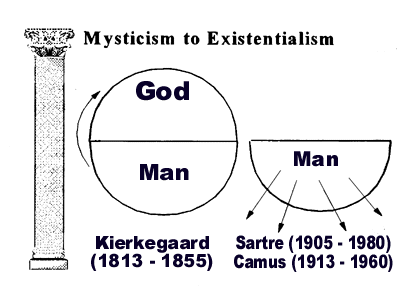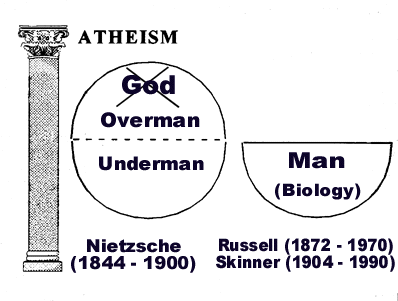The Flow of Western CultureRich Milne
As man's thoughts turned more and more inward, the possibility of hope became increasingly remote. Kierkegaard believed in a transcendent God, but not a God of much comfort. And soon after Kierkegaard's time, the whole notion of God would come to seem outdated and naive. The reaction among artists tended to be a rapid retreat from nature, and a growing sense of isolation from both the culture and the general audience. Art became something enjoyed and understood only by those who "knew the language," a language that was constantly changing.
Danish first, last, and for all his short forty-two years, Kierkegaard, like many religious reformers, saw as his battle a dead, state-run church. Added to this was a philosophy, Hegel's, which had engulfed most competition. Kierkegaard's goal was to wake people from their spiritual slumbers, and turn in faith to God as their one hope. One could hardly disagree with this, and Kierkegaard seems a sincere believer in God and Christ. But the way he chose to write in order to stir up the thinking of his readers often left in question just what he did believe. He was, however, clear about the fact that we cannot rationally reason our way to God. At some point, we must set aside our reason, and, by faith, reach out and take hold of God's promises. If you've ever heard of the "Leap of Faith" this is the guy that is usually pinned to. But Kierkegaard did not mean a "blind leap," but rather a leap of faith that believes in order to know. Kierkegaard's concern was that the church had become a place where people believed in a list of truths not in a personal God. His goal was to shake them up and confront them with a God who was paradoxical (that is supra-rational: He is in us and beyond the universe; He is in Christ, and eternally in the heavens; He foreknows all things and allows free will; He is personal, and yet infinite; He works in time, and yet is not in time).
The leap is neither blind nor arbitrary, since Climacus [the character in this dialogue who represents Kierkegaard] insists that the individual must have a clear idea of what he is leaping to (Christianity precisely defined by means of God's transcendent entrance into history) and why he might choose to leap (the consciousness of sin).{51} Kierkegaard replaces Descartes's doubt (the opposite of rational conviction) with despair (the opposite of faith for Kierkegaard). But real doubt is an unwillingness to give assent, and that cannot be overcome by knowledge, but only by an act of the will, a readiness of the will which we call faith. Kierkegaard argues that while the Bible may be historically true it doesn't matter, because faith is based on belief in God, not facts about God. But this begins the theological bifurcation of truth from experience, or history from what is True. Kierkegaard was concerned that objective statements of truth, such as creeds, had separated the believer from any real, personal contact with God. In "objectivity one tends to lose that infinite personal interestedness in passion which is the condition of faith." John Updike has a characteristically thoughtful couplet of praise to Kierkegaard:
Praise Kierkegaard, who splintered Hegel's creed Upon the rock of Existential need.{52} But, unfortunately, while splintering Hegel, Kierkegaard also opened the door to a great deal of existential dread, based on a God too distant to care about us or interact personally. Most non-Christian existentialists trace their lineage back to Kierkegaard, even if he would be appalled by his disciples. The next two men fall into this category.
Sartre is the existentialist of this century. More a writer than a philosopher, it was his public persona that won a hearing for his philosophy as much as its coherence or possibility. For a philosopher like Plato, our essence as humans precedes our actual existence as a particular human being. For Sartre, just the opposite is true. "Existence precedes essence." By this he means that we first are, and then we decide what we will be by what we do, what actions we take to affirm ourselves. "Man negates the nothingness of the world by creating an essence for himself, and a structure for the world."{53}
Like many existentialists, Camus focused on the absurdity of life, something that was easy to do for someone living through two world wars in thirty years. He is often associated with Sartre, but was both the better writer, and more consistent thinker. He felt suicide was an unauthentic response to the absurdity of the world. Instead, one showed resolve and true character by going on in the face of the absurdity, acknowledging it, but not giving in to it. But also like Sartre, Camus had no real hope to offer, being just as bankrupt as most philosophies when it comes to day to day living and the need for God that each of us has.
Both Nietzsche's father and grandfather were Lutheran pastors. His father died when he was nine. He was raised by his mother and various female relations. He was a sociable person, but lived in solitude much of his life. His life and work have been endlessly psychoanalyzed and interpreted, but often by those seeking to find what they wanted in his writings. He throws off all predecessors and is claimed by many different factions as supporting their cause. His work is filled with dramatic outbursts: "For impulses that others vent upon their wives or friends, or at a party, perhaps over drinks, Nietzsche had no other outlet."{54} While others had spoken of "God's death" before, no one had ever spoken the words with such savage clarity as Nietzche.
The greatest recent event--that 'God is dead,' that the belief in the Christian God has ceased to be believable--is even now beginning to cast its first shadows over Europe. . . . [T]he event itself is much too great, too distant, too far from the compre- hension of the many even for the tidings of it to be thought of as having arrived yet, not to speak of the notion that many people might know what has really happened here, and what must collapse now that this belief has been undermined--all that was built upon it, leaned on it, grew into it; for example, our whole European morality . . . . Indeed, we philosophers and 'free spirits' feel as if a new dawn were shining on us when we receive the tidings that 'the old god is dead'; our heart overflows with gratitude, amazement, anticipation, expectation.{55} Nietzsche saw himself as a prophet, one who saw that God was dead, and recognized the future consequences, just as he saw that people were not yet ready to hear this message, let alone the moral results that Nietzsche saw all too clearly. Nietzsche speaks to the individual, not to "the people," or to a political party. "I want no believers; I think I am too malicious to believe in myself; I never speak to the masses."{56} And what is it that Nietzsche wants his listener to do? To reject the lies of religion and become like himself.
I negate a type of man that has so far been considered supreme: the good, the benevolent, the beneficent. And then I negate a type of morality . . . the morality of decadence or, more concretely, Christian morality. . . . I take the overestimation of goodness and benevolence on a large scale for a consequence of decadence, for a symptom of weakness, irreconcilable with an ascending, Yes-saying life: negating and destroying are conditions of saying Yes.{57}Nietzsche did not think much of Christianity! But in his desire to cast off Christian morality he only carries to its logical conclusion what philosophers had been leading up to since at least Hume. Nietzsche is consistent in his world view in a way that few philosophers have been. The death of God is both terrible and freeing news. We are finally free of the moral straitjacket of Christianity, but we are also cut adrift from all morality. What will we do? As what we call the Modern Age replaced the Industrial Age, other thinkers offered solutions to this dilemma.
An American-born Harvard professor, Skinner is best known for his work with rats and pigeons. Using rewards (positive reinforcement) for the desired behavior and punishments (negative reinforcement) for undesired behavior, Skinner showed that he could train animals to follow a consistent pattern of behavior. His ultimate goal was to show that humans are just more complicated animals, and that by using "operationism" humans can be trained to always live in peace and harmony. In his rather weakly written novel Walden Two, Skinner draws out the story of how a utopian community using his methods would work. In another book, Beyond Freedom and Dignity, Skinner remarks "To man qua man we readily say good riddance."{59} The "Beyond" of Skinner's title really means "abolition." (In this context he mentions Lewis: "C. S. Lewis put it quite bluntly: Man is being abolished."{60}) What is being abolished is autonomous man--the inner man, the homunculus, the possessing demon, the man defended by the literatures of freedom and dignity. Put in Skinner's terms: "Personal exemption from a complete determinism is revoked as a scientific analysis progresses, particularly in accounting for the behavior of the individual."{62} And what is man? "[M]an is not a moral animal in the sense of possessing a special trait or virtue; he has built a kind of social environment which induces him to behave in moral ways. . . . . A self is a repertoire of behavior appropriate to a given set of contingencies."{63} The consequence of all of this is that, for Skinner and behaviorists in general, man is a complex stimulus response machine who can be trained to be peaceful and useful. Skinner's world view is the ultimate mechanistic psychologist's dream: give us the controls and we will create the best society. Skinner and the behaviorist's world-view is that of naturalism, but a determined naturalism that is totally reductionistic: all human behavior is only learned response and there is no "person." Within this world view, those who can are at liberty to try to remake society in any way they can. They too are only machines trying to make other machines work better.
A philosopher whose life spans much of modern history, Russell saw and commented on most of what we consider modern culture. Russell was born, educated, and died in England, but none-the-less traveled and lectured in much of the world in his lifetime, and was involved with as many women as he could while he was able. Most significant in his work in mathematics but most influential in his pronouncements on morality, Russell was one of the earlier popularizers of "free love," firstly in his own life. His three divorces and four marriages hint at his willingness to leave one woman for another, and when asked whether his wife resented his affairs with other women he responded: "Any woman worth loving would sooner have one-tenth of a first-rate man than all of a tenth-rate one."{64} Yet, because of his opposition to the Viet Nam war, he came to be seen as the moral voice of a nation, and an elder statesman of the peace movement. His work in mathematics set it on a new and rigorous logical base, as well as encouraged much clearer thinking about clearer definition of the problems of philosophy. But here, too, his emphasis on logic led him to eliminate any spiritual possibilities.
|


